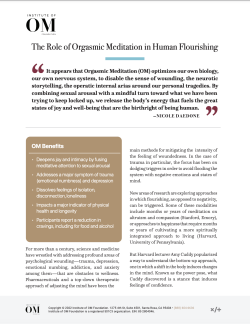The Vision Behind the Foundation
Learn about the inspiration for the Institute of OM Foundation from Orgasmic Meditation creator Nicole Daedone.
A Spotlight on OM
Read pioneering psychedelic researcher Dr. Roland Griffith's remarks on Orgasmic Meditation and the mystical state.
The Institute of OM Foundation is the premier non-profit research center focusing on peak state consciousness arising from the practice of OM as it pertains to improvements in the areas of trauma, depression, general health and the advancement of eudaimonia.
New Study
The Female Power of Volitional Attraction: The Concept of Call
Griggs, C. & Pelletier, R. | SSRN, February 11, 2025
Some women report a volitional, conscious ability to draw the attention of others, called Call. Call is hypothesized to be universal in all women, but a concise instrument that adequately evaluates this innate ability does not currently exist. This IRB-exempt survey study designed a 20-item questionnaire and collected scores from 2017 women in the US. Results demonstrated convergent validity, reliability, and internal consistency of the scale. Call was also shown to be correlated with personality traits such as extraversion and openness.
New Study
Alterations in cerebral glucose metabolism measured by FDG PET in subjects performing a meditation practice based on clitoral stimulation
Newberg, A. MD. | F1000 Research, December 21, 2023
In an fMRI study looking at 40 OM meditators compared to non-meditators, it was found that Orgasmic Meditation creates a distinct pattern of brain activity, for both men and women, that is a hybrid between that of other meditation practices and sexual stimulation. Such findings have potential psychotherapeutic implications and may deepen our understanding of the relationship between spiritual and sexual experience.
New Study
Orgasmic Meditation and The Mystical Experience: A Case Study
Griggs, C. & Pelletier, R. | SSRN, February 3, 2025
Orgasmic Meditation (OM), a structured attention training practice conducted between two people following a predefined set of detailed instructions. The practice involves one person gently stroking the clitoris of another person for 15 minutes while both place their attention on the point of contact, noticing what they feel. Practitioners of OM reported the practice triggers a mystical state and is distinct both from typical sexual engagement and other meditations (Siegel, et al., 2021). Mystical experiences have been of interest over the centuries and are beginning to be seen as a path to healing for mental health and well-being.
New Study
Phase 1 Clinical Trial on Orgasmic Meditation (OM): Assessing Safety and Feasibility as a Meditation Practice for Individuals with PTSD
Kriegman, D. PhD | Contemporary Clinical Trials Communications, February 10, 2025
This Phase 1 Clinical Trial, involving 14 pairs who scored as having PTSD symptoms, sought to measure the safety and efficacy of a treatment protocol that includes Orgasmic Meditation (OM) for PTSD. Results included a 47% improvement in PTSD scores. Most importantly, participants rated the modality as a 4.9/5 on safety. These results suggest that Orgasmic Meditation may be safe for this traumatized population, and may ameliorate symptoms of PTSD. Further research appears to be warranted to determine the efficacy of OM in treatment of PTSD .
New Study
An analysis of practitioners Journaled experiences
of Orgasmic Meditation (OM)
Griggs, C. & Regan, R. | Sexual & Relationship Therapy, May 25, 2025
This study aims to evaluate OM practitioners’ journals and the link to eudaimonic well-being. The study conducted an analysis of 1,506 journal entries by OM practitioners. The strokers had five themes, including: 1) connected with partner, 2) took control of the process, 3) conscious of the act and process, 4) post-OM experiences, and 5) struggled with the OM process. The strokees had four themes consisting of: 1) opened oneself to the sensation, 2) lost oneself, 3) a sense of security, and 4) felt freed. The qualitative results of this content analysis study show OM practitioners access eudaimonic well-being through flow, connection, and intimacy. This suggests Orgasmic Meditation may be a practice to enhance eudaimonic well-being, access states of flow, increase connection, and create experiences of intimacy. These results have implications for the practice and how it may be applied to well-being interventions.
OM & Health: Hear from Physicians
Hear directly from medical practitioners how OM uses the body's natural biology for healing.
The OM Science Library
VIEW RESEARCH SUMMARY
Read The Research
Read the Publications
OM Science in the media
For the Press
Scientific Efforts and Clinical Findings
Many people have participated in scientific studies showing that OM has benefits to their mental and physical health.
The Role of OM in the Science of Flourishing
View a summary of research on the benefits of OM for promoting human flourishing.
There’s this sense in OM of the core sense of unity, this interconnectedness of all people and things.
–Roland Griffiths, PhD
Read more
“Future studies will focus on the impact of OM on reducing signs of aging including mental agility, alertness and focus.”
— Andrew Newberg, MD
“Early studies show that in only 15 minutes, OM can provide improved connection and closeness.”
— Nicole Prause, PhD
“Brain activity in OM practitioners is more similar to meditation than sex.”
— Andrew Newberg, MD
“OM may allow practitioners to access similar brain and meditation states attained by advanced Tibetan Buddhists.”
— Greg Siegle, PhD
“OM can reduce cravings for extended periods.”
— Reese Jones
Get Updates on New Research





